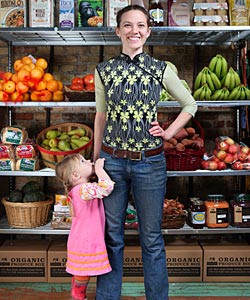
When Manda Aufochs Gillespie sits down in front of her computer in her Rogers Park condo, she usually finds her e-mail inbox flooded with questions: What are the benefits of cloth diapering? Where should I buy baby bottles? Gillespie searches until she finds environmentally sound answers; then she posts them on her Web site, thegreenmama.com, which has readers across the United States and Canada. “The site is for people who are trying to be green parents in any major city,” says Gillespie, an environmental consultant and teacher. “It’s a tool for living.”
Last year, Gillespie decided to take her discussion forum beyond the Web, so she started a series of classes called the Green Mama Cafe at the Peggy Notebaert Nature Museum in Lincoln Park. Now a group of women meet every Tuesday to discuss everything from organic crib mattresses to grass-fed beef. For about an hour, as their children munch on organic rice puffs, the moms (who pay $5 each class) swap canning tips and talk about their experiences with home-delivery fruit and vegetable boxes.
By the end of each meeting, it’s obvious: This is a growing consumer group that is hungry for more products and information—and they’re willing to spend some green to get it. Little do the women who participate know, but they are a marketing gold mine—a category 15 million to 20 million strong with an estimated $209 billion reach, according to Integrated Marketing Group, a Utah-based company. Distrustful of TV and other mass media, they get information from people like Gillespie, who is serious, but not absolute. “I’m not a nagging, judgmental environmentalist mom,” Gillespie says. “I’m not going to say, ‘You’re not green if you use a disposable diaper,’ or ‘Your kid is going to die if they eat McDonald’s.’”
As a demographic, “green mamas” are constantly searching for information, reading every label, and using word of mouth to share what they find—which is why the weekly classes at the Notebaert are so influential. And popular. “We always have to go running for chairs!” says Gillespie. “We usually have at least 12 mamas—and lots of babies.”
Photograph: Katrina Wittkamp


